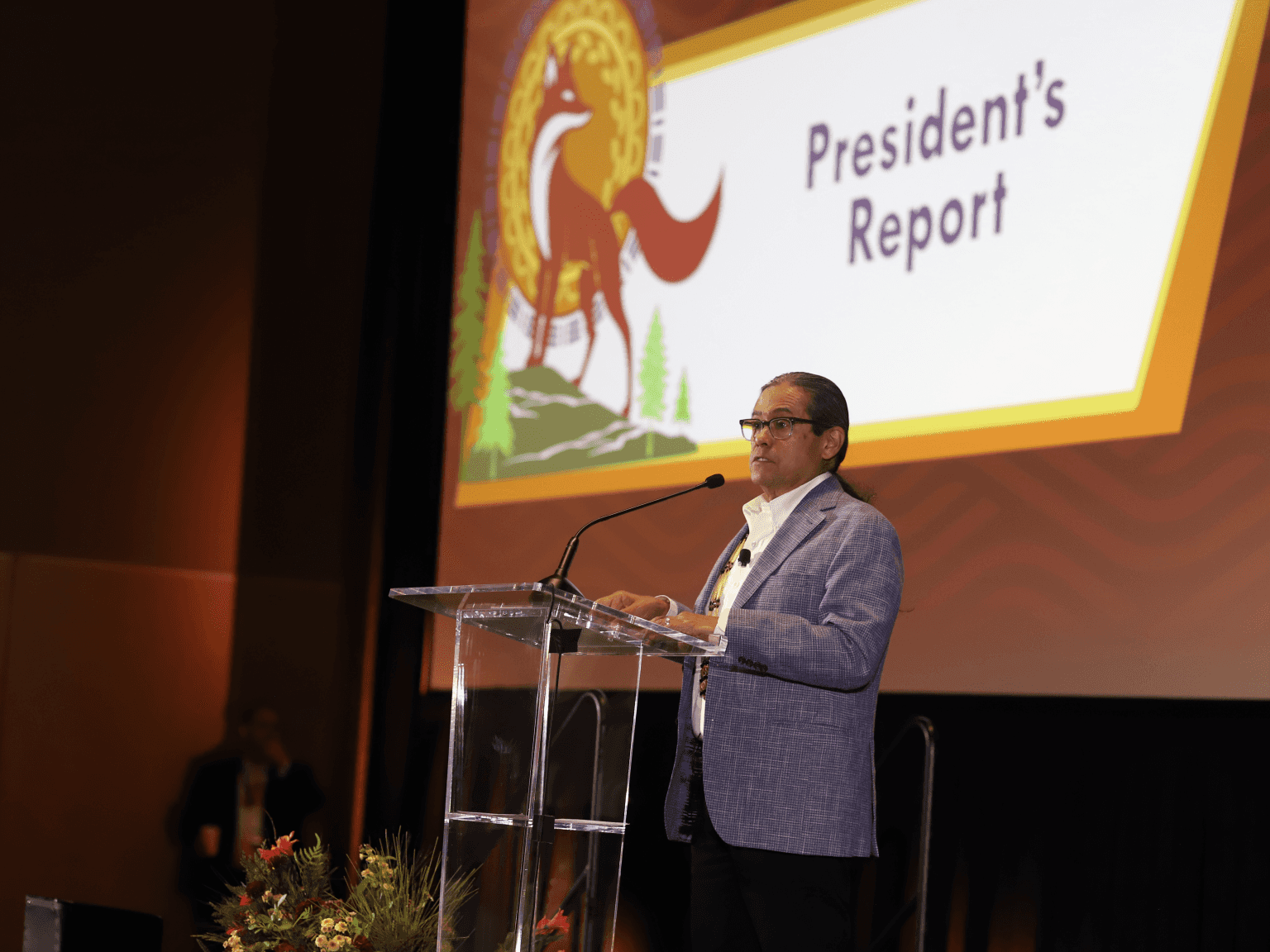
Mark Macarro, President NCAI
The National Congress of American Indians Mid Year Convention is a place where policy, sovereignty and grassroots advocacy converge. This year, the Buffalo’s Fire and Indigenous Media Freedom Alliance team was on site, reporting live from Foxwoods Resort Casino in Mashantucket, Connecticut.
Over three days, we divided up, coordinated, and chased down sessions that signaled turning points, exposed tension or reinforced urgent priorities. Through our Daily Sparks coverage, we offered micro-news stories on the ground, but here’s a fuller look at what we saw, heard and ran to report.
The fight to protect Native health programs
In a session filled with line-by-line edits and consensus-building, the NCAI Health Subcommittee passed six resolutions with unanimous support. The measures called for preserving Indian Health Service funding, protecting Medicaid access, and elevating the IHS director’s role within HHS. Panelists also pushed back against proposed cuts in the FY 2026 budget that would reduce tribal access to core health programs. Read more
Why data gaps still undermine sovereignty
In a session on tribal finance and intertribal cooperation, Native economic leaders underscored how the lack of reliable economic data makes tribal nations invisible to funders and policymakers. “Data is one method for tribes to tell our stories—as individual nations and collectively,” said Amber Schulz-Oliver. Without it, capital access and policy leverage remain limited. Read more
Urgent call to action against violence on Native women: Even when it seems there is no hope, keep fighting
During a panel on the Violence Against Women Act at the National Congress of American Indians on Monday, leaders and survivors shared haunting statistics and personal testimonies, asking for systemic change and accountability, while rallying their communities to do more. “The system was not designed to save our relatives, it was designed to eradicate us,” said Mary Kathryn Nagle, general counsel for the National Indigenous Women’s Resource Center. Read more
A Call to preserve native media and public broadcasting
One resolution urged Congress to reject the proposed elimination of the Corporation for Public Broadcasting and preserve funding for NPR and PBS. Native-serving outlets such as Vision Maker Media, Koahnic Broadcast Corporation, and Pacific Islanders in Communications would be directly affected. Koahnic’s National Native News, distributed by Native Voice One, reaches nearly 200 radio stations across the U.S. and Canada, bringing Indigenous perspectives to rural and urban audiences alike. Read more
Federal procurement and development tools under threat
The Economic, Finance and Community Development Committee advanced several resolutions aimed at protecting Native economic and media infrastructure. These included a call for Congress and federal agencies to preserve the “Rule of Two” in federal contracting to safeguard small business access for Native-owned entities; a resolution urging the Federal Emergency Management Agency to reinstate the Building Resilient Infrastructure and Communities program and engage in meaningful tribal consultation before canceling tribal awards; and a resolution opposing proposed cuts to the Corporation for Public Broadcasting, which would impact Native-serving media outlets. Read more
Legal experts on precedent, litigation and voting rights
In a joint panel from the Native American Rights Fund and NCAI, legal experts emphasized strategy, not just litigation. They discussed recent Supreme Court decisions weakening environmental protections and the denial of Apache Stronghold’s case. NARF also warned that a recent ruling in North Dakota could strip tribal citizens of the right to bring voting rights cases unless overturned. Read more
To follow the status of all resolutions discussed at the Mid Year Conference, visit NCAI’s Resolutions Tracker. Buffalo’s Fire and the Indigenous Media Freedom Alliance will continue coverage at NCAI’s 82nd Annual Convention & Marketplace in Seattle this November.
Teresa Trumbly Lamsam, Ph.D. (Osage Nation)
Former Director of Research
Location: Branford, CT
See the journalist pageHelp us keep the fire burning, make a donation to Buffalo’s Fire
For everyone who cares about transparency in Native affairs: We exist to illuminate tribal government. Our work bridges the gap left by tribal-controlled media and non-Native, extractive journalism, providing the insights necessary for truly informed decision-making and a better quality of life. Because the consequences of restricted press freedom affect our communities every day, our trauma-informed reporting is rooted in a deep, firsthand expertise.
Every gift helps keep the fire burning. A monthly contribution makes the biggest impact. Cancel anytime.







